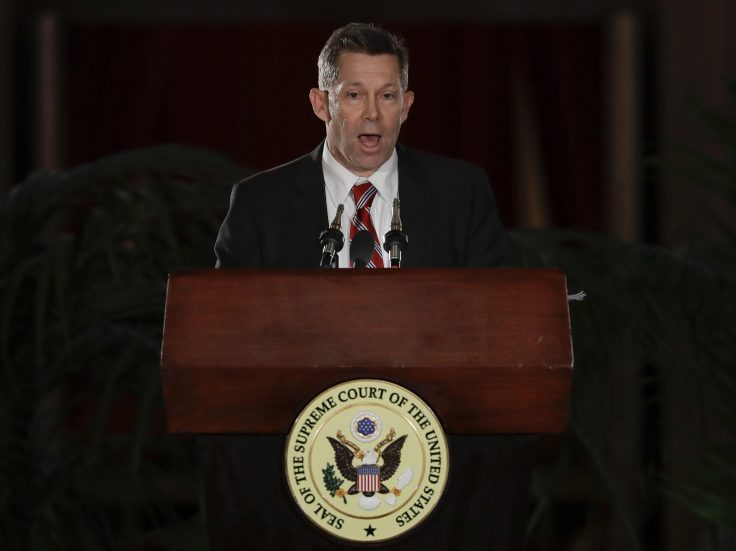The Biden administration's employer vaccine mandate took a beating this week from one of the nation's top judges, a major win for red states and conservative groups fighting it in court.
Chief Judge Jeffrey Sutton of the Sixth U.S. Circuit Court of Appeals in a lengthy dissenting opinion released Wednesday called the mandate an unjustified overreach. Mandate challenges will inevitably reach the Supreme Court, where Sutton's views carry weight, and his dissent provides a useful roadmap for justices inclined to strike the rule down.
"A dissent at the appeals court often grabs the attention of Supreme Court justices, and even more so when it's written by someone like Chief Judge Sutton, who is respected across the board and has sent former clerks to work for every single sitting justice," said the Pacific Legal Foundation's Elizabeth Slattery.
The vaccine mandate is on shaky political ground. Democratic senators Jon Tester (Mont.) and Joe Manchin (W. Va.) last week joined all 50 Republicans to pass a repeal measure in the Senate. And surveys show that a lopsided majority of Americans are tired of pandemic restrictions. Almost 70 percent of respondents told the Trafalgar Group that new mandates and restrictions are not required to manage the COVID-19 Omicron variant.
Sutton's dissent laid out two principal problems with the mandate. First, he said the states are primarily responsible for managing public health, and Congress needs to speak clearly when it reassigns power from the states to an agency. Second, the Occupational Safety and Health Administration has no power to mandate 80 million worker vaccinations under federal law, he said.
Those arguments have been advanced elsewhere, but Sutton added additional observations. If Biden is right on the law, he said a future administration could trend in the opposite direction by passing laws that ban mask mandates, vaccine passports, and stay-at-home orders on the state and local level.
"It's worth remembering that, if one casually accepts congressional authority to regulate in this area, that recalibration of power comes with easy-to-overlook risks," Sutton warned. "The power to give with preemptive national regulation includes the power to take away."
Sutton also addressed arguments from the Biden administration and outside supporters that say the OSHA directive isn't really a mandate. They emphasize that the rule gives workers a choice between two alternatives: Get vaccinated or take a weekly test.
Sutton countered that the OSHA rule is clearly "coercive in favor of vaccination." Employers can duck costly compliance requirements if they mandate vaccines on their own. Time off must be provided for vaccination and recovery from side effects, but no accommodation is made for testing, which might require travel, especially in rural areas. And OSHA normally requires employers to pay for testing and occupational safety gear, such as masks. Workers are saddled with those costs under the vaccine rule.
Secretary of Labor Marty Walsh, who supervises OSHA, gave the game away when he noted in an accompanying analysis that the rule would boost the adult vaccination rate among affected workers from 62 percent to 89 percent, Sutton wrote.
"These estimates as an initial matter lift the veil on the Secretary's understanding of the rule, revealing that he thinks it will operate much more like a vaccine mandate than a vaccine option," Sutton wrote.
OSHA and the Department of Labor issued the vaccine rule using emergency procedures. Those procedures have been used nine times since the agency was chartered, Sutton wrote, and never to compel a medical procedure. Only four of those emergency regulations ultimately took effect, per his canvass of the history.
Sutton is a leading figure in the clubby world of the federal courts. He's a top "feeder judge" who sends many of his law clerks on to Supreme Court clerkships. His textbooks and legal writings win rave reviews from former justices and legal authorities left and right. Chief Justice John Roberts has twice selected Sutton to lead special judicial committees that offer guidance on court procedure.
The judge handed down his dissent after the Sixth U.S. Circuit Court of Appeals rejected a request to leapfrog normal process and hear mandate challenges in its full 16-member complement. Republican appointees have an 11-5 majority on that body. As a result, the cases will go to a randomly assigned panel of three judges, where the Biden administration has a shot at a friendly draw. A special judicial panel consolidated all challenges to the OSHA rule at the government's request. The Sixth Circuit was selected by lottery to hear those challenges.
Seven other Sixth Circuit judges joined Sutton's dissent. The court has not yet announced the composition of the three-judge panel that will hear the OSHA challenges.
